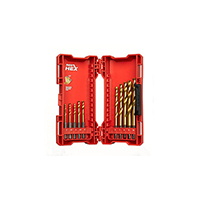- Joined
- 31 Mar 2013
- Messages
- 524
- Reaction score
- 48
- Country

At that price I'd probably chuck the idea.

That wasn't an optionAt that price I'd probably chuck the idea.

That wasn't an option


My set-up utilises a 1/2in keyed chuck (in point of fact a spare DW unit I had) which threads onto the front. I didn't want to use the original Rohm keyless chuck off the Bosch drill because like all keyless chucks it is longer than an equivalent keyed chuck - and when you are side drilling sistered joists in situ you tend to need every millimetre of space you can get.
Err, nope. The one I bought requires a drill with a male threaded arbor mounting on the drill (1/2in UNC 20 tpi - the sort of de facto standard for 1/2in corded drills) and the drive is provided by a pair of hex nuts which need to be locked together on the drill's threaded arbor. It looks like this:
a 1/2in UNC shaft will take a lot more abuse than a 1/4in hex drive shank.
You may say that, but their response might be something along the lines of "if you need professional advice you should be talking to, and buying from, one of our dealers - who have staff trained to answer your queries".
YesSo you wind your attachment on and use the provided nut as a limiter and then clamp it using the lever?
Your attachment is designed for use with a cordless tool - that tool in turn is not capable of the continuous heavy duty work I required, because it would either overheat, or cook the batteries, or strain my wrist because the body is so short. You keep quoting torque figures at me, but will your drill generate that amount of torque continuously (as opposed to momentarily)? I have a fairly torquey main cordless drill, a Mak DHP481, and it is pretty robust, but after 20 or 30 large deep holes it does start to get hot, as do the batteries. Not good, but not untypical. GIven that most holes through materials such as pine joists don't actually need 110Nm of torque (unless, of course, you are in the habit of using 38mm QUOTE="opps, post: 5482552, member: 34439"]I understand your sentiment, but my cheaper attachment is rated at 110Nm Vs 100Nm for yours.
Then maybe choose a better dealer (one who knows what he is talking about - difficult to find, I know. I made friends with the repair guy at one dealer I have used and he is a far better source of info because he repairs the stuff, butbisn't trying to sell me anything), or talk to the manufacturer, or his rep on trade shows....why should a tradesman have to phone a dealer? I do not want to have a 10 minute conversation with someone that just repeats the (incomplete/inaccurate) blurb that I can read on the manufacturer's site?
Ive had that with a lot of the bosch hex shank, but discovered the milwaukee shockwave hex shank hss bits which appear to be well engineered and robust in use.And were you aware that 1/4in hex shanks can wind up and snap like carrots if over torqued?

I have no idea why the price differential, however as mine came to me in 2015 with a "Made in Germany" sticker, and Metabo have moved a lot of production to China in recent years, might that not be part of the answer? TBH at the time I bought mine I could not find a suitable alternative. Bear in mind that I akready had am 1100 watt heavy duty 2-speed drill, that there really weren't any viable cordless angle drills (I did own a Makita 18 volt cordless LXT angle drill back then) and that the one readily available, relatively affordable heavy duty angle drill, a Makita, was over £300. So Bosch and Metabo adaptors were really the only other game in town. And if you want to attach an angle head to a conventional corded drill they still are, although there are quite a few heavy duty cordless angle drills out there now, from DW, Milwaukee (the "Hole Hawg") and Makita:Yes
Your attachment is designed for use with a cordless tool - that tool in turn is not capable of the continuous heavy duty work I required, because it would either overheat, or cook the batteries, or strain my wrist because the body is so short. You keep quoting torque figures at me, but will your drill generate that amount of torque continuously (as opposed to momentarily)? I have a fairly torquey main cordless drill, a Mak DHP481, and it is pretty robust, but after 20 or 30 large deep holes it does start to get hot, as do the batteries. Not good, but not untypical. GIven that most holes through materials such as pine joists don't actually need 110Nm of torque (unless, of course, you are in the habit of using 38mm QUOTE="opps, post: 5482552, member: 34439"]
Lets assume that the gearing components are pretty much the same, the key difference seems to be the external thread on the business end of your attachment and the internal thread on the drill side.
I still cannot see why the price differentials are so high. Am I missing something? Yours has a slightly lower torque rating than my "similar" looking right angle attachment. Mine has a slot in the business side shaft and a hex receiver.
If you need to find a tradesperson to get your job done, please try our local search below, or if you are doing it yourself you can find suppliers local to you.
Select the supplier or trade you require, enter your location to begin your search.
Are you a trade or supplier? You can create your listing free at DIYnot Local
